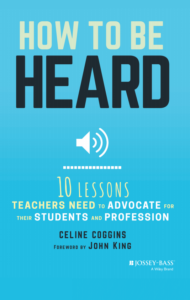This post is part of Coffee and Conversation, a monthly interview series that highlights impactful, interesting work affecting Tennessee education. The founder of Teach Plus, Celine Coggins, joined us to discuss her latest book and how teachers can become advocates for their students’ success. The interview has been edited for length and clarity.
Peter Tang: Why did you write this book?
Celine Coggins: I’ve spent ten years of my life working with teachers to try to give them a voice in policy. I’ve worked through a number of different contexts in different states. I think there are principles teacher need to know to be effective at the policymaking table. I thought I could write a book that captures inspiring stories from teachers who have been successful at advocacy, really changing the lives of their students and other teachers, and at the same time, it would be a how-to guide.
We’ve talked about this with our SCORE Educator Fellows a lot, but I think you will have really great insight into this – why should state and local education leaders look to engage teachers in policy conversations? What types of support do teachers need to be successful partners in those conversations?
CC: For the “why should” question, teachers are the implementers of every policy. The policy’s success lives or dies with them.
To your next question, we have a framework that takes teachers through the idea that policy is based on three ideas. Number one is equity – how do I address the question of offering all students in my system an opportunity to learn. Number two is about resources – there’s a lot we want to do, but there’s never going to be enough money. And the third part of the triangle is accountability – people want to know where [public] money is going, and we need to know whether something is working or not. We orient our training to teachers fitting their ideas right through the middle of the triangle of equity, resource scarcity, and accountability.
Teachers often jump on equity matters easily, but sometimes teachers find it harder to engage effectively on the resources and accountability side of the triangle.
CC: The budget is not impossible to understand. When the Boston Public Schools budget comes out, a teacher will post it on Facebook and tag other teachers, saying, “Let’s look. Let’s see what got shifted from year to year. Did the money for the program we care about remain – did it go up or down?” Then, they build a strategy for talking to school committee members to push for changes before the budget is finalized.
You have been doing this for a long time. How has the landscape for student-focused teacher advocacy changed over time?
CC: The conversation has fundamentally changed. It’s really about how teachers advocate for their students’ needs. This work of advocacy fits deeply into a larger movement around teacher leadership.
What advice do you have for a teacher who is looking to understand the larger system they work in? How do they get started with an eye toward student-focused advocacy that is informed by their classroom experience?
CC: There is not a single person on the opposite side of that decision-making table that doesn’t want to hear from teachers. Teachers have more power than they realize, and hopefully they take advantage of it.
You also want to understand the boundaries of policymaking. I’ve seen teachers use all of their chips on “throw out all testing.” Well, that’s a federal law. You’re going to get excluded from the policymaking table because state-level leaders are going to say, “We don’t have a choice.” You are rendering yourself irrelevant by using your teacher voice for something outside of the boundaries of state policymaking. So, you’ve got to do some basic homework on the triangle of equity, resource, and accountability.
What do you hear about teacher advocacy in Tennessee?
CC: The state of Tennessee did really well in policymaking with the high standards. Enlisting teachers in the process of understanding what’s in the standards and [letting them] be the transmitters of knowledge to additional teachers is a really big deal. I think that’s something that Tennessee has been known for and is exactly the right way to do things.
What’s your afternoon pick-me-up?
CC: My vice is Diet Dr. Pepper. So if I am really tired, I’ll have a Diet Dr. Pepper.
A former middle school teacher, Celine now teaches at the Harvard Graduate School of Education. Until last summer, she led Teach Plus, the organization she founded a decade ago to empower excellent, experienced teachers to take leadership over key policy and practice issues that affect their students’ success. Under Celine’s leadership, Teach Plus introduced groundbreaking programs and built a nationwide network of over 26,000 teachers. At Harvard, Celine teaches coursework in teacher quality policy and serves as an Entrepreneur-in-Residence, supporting the next generation of social entrepreneurs.
Get Celine’s book, How to Be Heard: Ten Lessons Teachers Need to Advocate for their Students and Profession.


